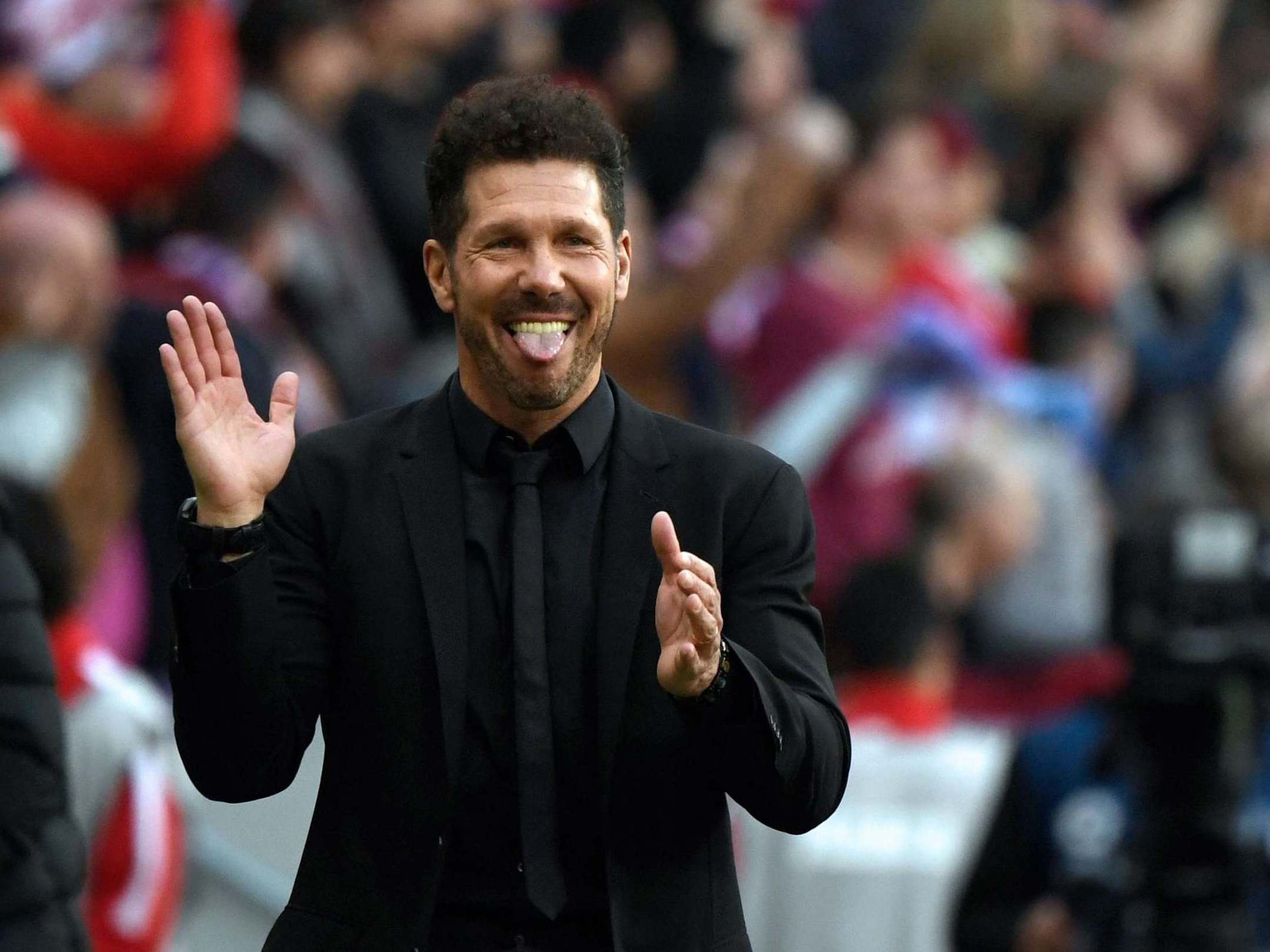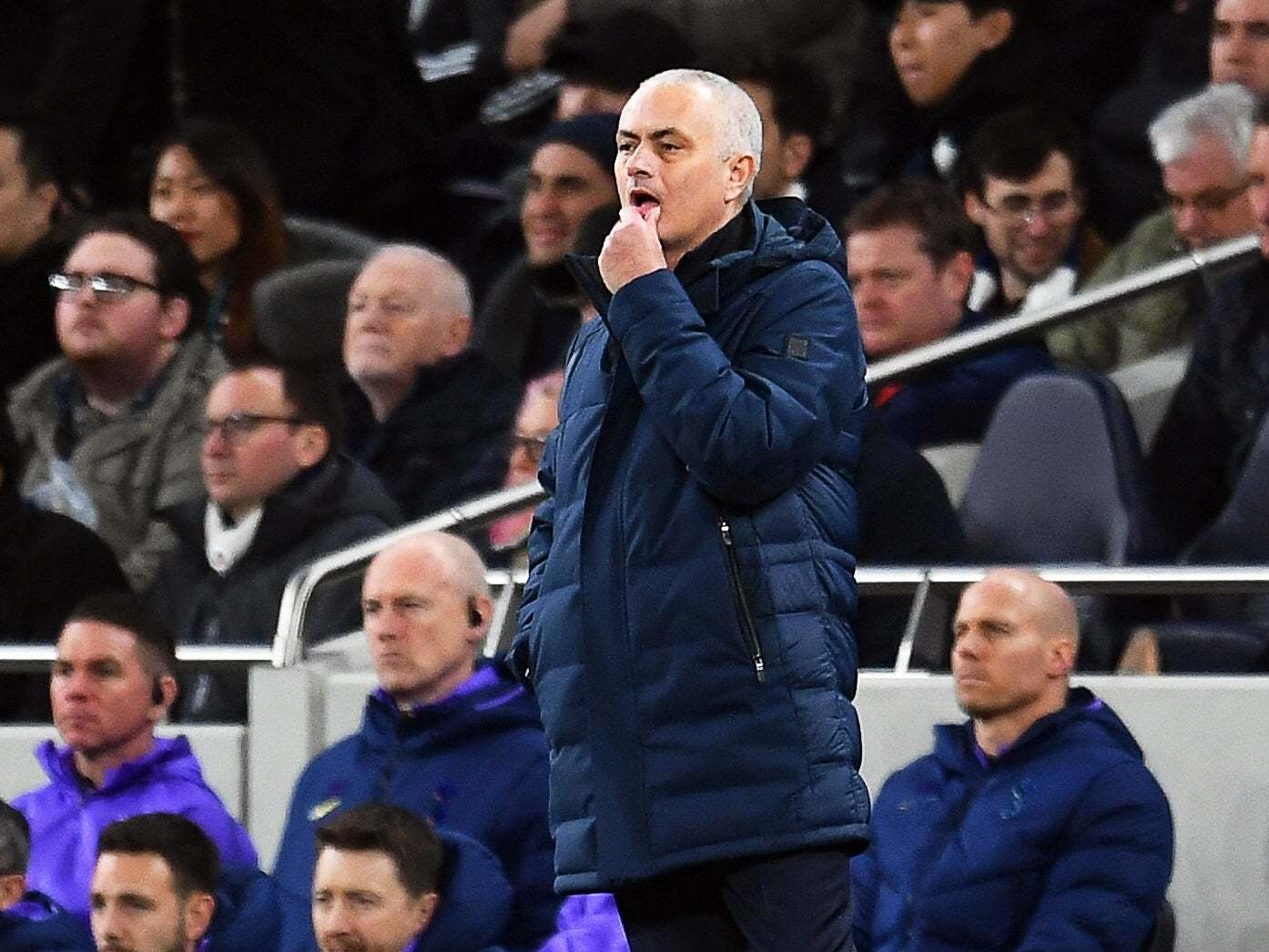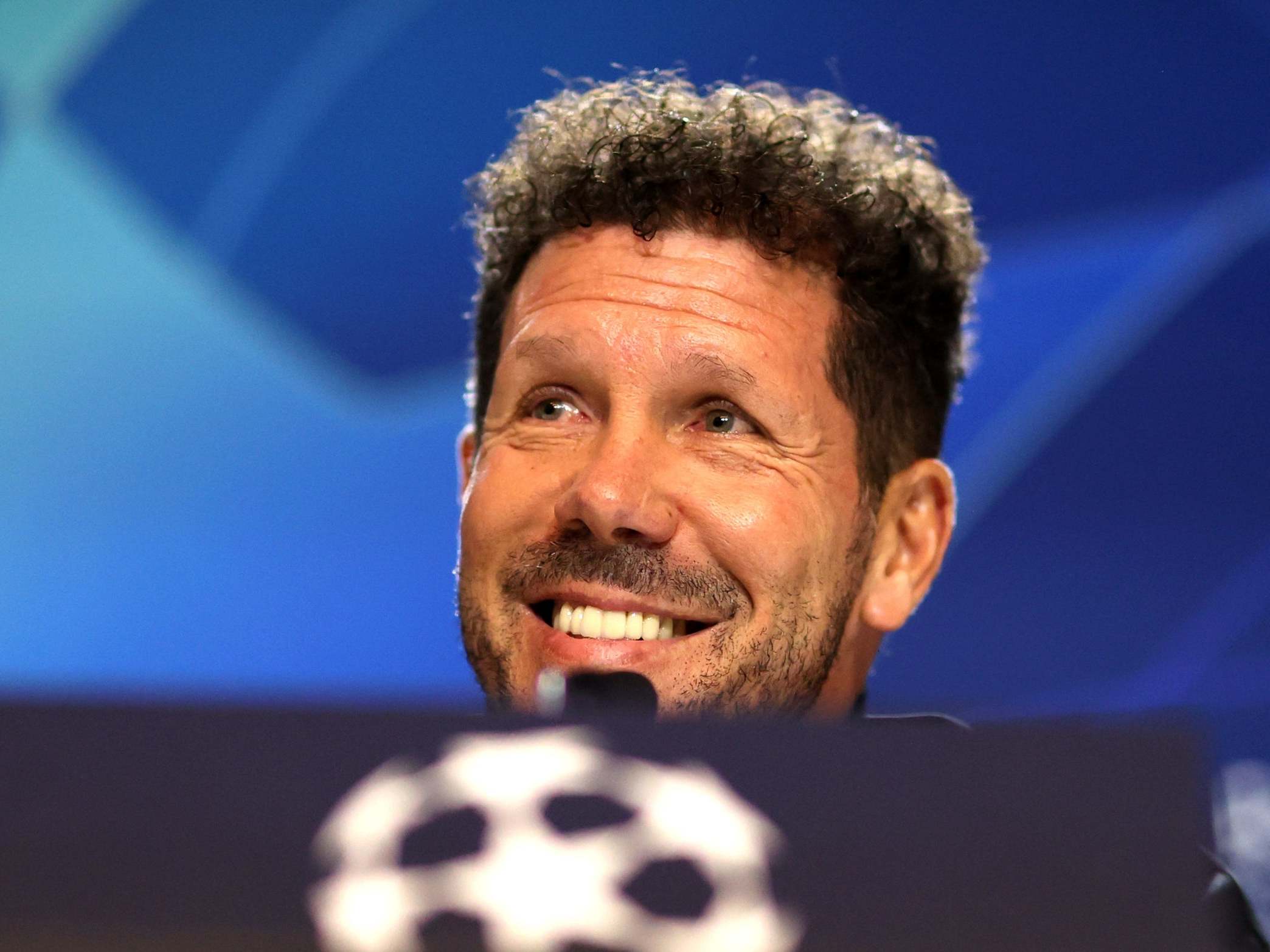The battle for defensive football: Liverpool vs Atletico Madrid will prove if all-out defence still has a place in the modern world
Diego Simeone and Jose Mourinho are the last bastions of a dated style that has been consumed by the attacking revolution that Pep Guardiola’s Barcelona triggered, with the Champions League last-16 tie set to reveal if all-out attack has taken over

Your support helps us to tell the story
From reproductive rights to climate change to Big Tech, The Independent is on the ground when the story is developing. Whether it's investigating the financials of Elon Musk's pro-Trump PAC or producing our latest documentary, 'The A Word', which shines a light on the American women fighting for reproductive rights, we know how important it is to parse out the facts from the messaging.
At such a critical moment in US history, we need reporters on the ground. Your donation allows us to keep sending journalists to speak to both sides of the story.
The Independent is trusted by Americans across the entire political spectrum. And unlike many other quality news outlets, we choose not to lock Americans out of our reporting and analysis with paywalls. We believe quality journalism should be available to everyone, paid for by those who can afford it.
Your support makes all the difference.In the Atletico Madrid squad, a distinctive tone is already being set.
“We’re going to need big f****** balls,” has been the regular cry, because they know they won’t often have the actual ball.
Diego Simeone’s side have been priming themselves for one of those rare Champions League nights, where it really is all-out defence against all-out attack, amid the all-consuming atmosphere of Anfield. It is going to be intense.
In so defiantly trying to defend their 1-0 lead, though, they will not just be facing wave after wave of Liverpool attack. They will be fighting the tide of football history, and its future.
The vast majority of teams just don’t try to play like Atletico do any more.
Among the very few are Jose Mourinho teams, which makes the fact Tottenham Hotspur are facing RB Leipzig the night before a little more timely. It means these two games together almost serve as a referendum on an entire way of playing, that used to be half the sport.
The question is whether defensive football at the top level is dead? Can it really be successful, in any kind of sustainable way?
The broader trends are by now undeniable. Attacking football reigns. Virtually every figure in the sport states this.
The numbers make it clear. Goal averages have shot up. In the Champions League, they have risen from an average of 2.55 per game in 2004-09 - what you might call the Mourinho/Rafa Benitez “control” era - to 2.97 across 2014-19. That is a significant spike, that reflects a rise right across the game.
Much of this down to deeper changes, that were effectively sparked by the coaching revolution caused by Pep Guardiola’s Barcelona.
Youth coaching began to prioritise technique over anything else, to make every player first and foremost a “universalist”. More basic defensive qualities began to recede. It has meant, as Sam Allardyce put it in one recent lament for defending, “if you don’t play to your centre-halves out of the back, then you’re not playing the right way”.
That way has broadly become based around possession, and winning possession through pressing.
It is from there, however, that so many intricacies arise and the question gets more interesting. All of these changes, after all, only explain why goalscoring football is more prevalent. They do not explain the bigger issue, which is whether defence-based football can still actually be successful.
One thing doesn’t change: results remain the be-all and end-all. Football history has proven that if a style wins more games, teams will replicate it.
And this is what is really relevant. As a little thought experiment, consider how often you actually see modern Champions League teams successfully knock out another through classic defensive displays or backs-against-the-wall security alone.
There aren’t too many. Mourinho’s elimination of Barcelona with Inter Milan remains the landmark display, but that was a decade ago. That second leg now feels like the last stand of a declining tactical era, rather than its defining moment.
Since then, such displays have become pronounced only because they’ve been so rare. Most have involved Atletico, from the 2013-14 quarter-final victory over Barcelona to the 2015-16 elimination of Guardiola’s Bayern Munich.
Simeone’s side have actually been responsible for 7.3 per cent of the total clean sheets from the Champions League knockout stages they’ve been involved in since he took over, and the number of those have also dropped.
Whereas that 2004-09 period saw 95 knockout clean sheets, 2014-19 has only seen 83. The number of knockout 0-0s has also fallen from 17 to 14, and 1-0s from 35 to 19.
In other words, you can’t bank on such classic scorelines as much. There’s simply been too much chaos in the Champions League. You need much more than sitting tight and hoping for a bit of magic. There's much more to the game.
Atletico themselves haven’t had such a display in the competition since 2016-17. They even failed to hang on against Juventus last season, having been as much as 2-0 up from the first leg.
Thiago Alcantara, whose career has come right across this era, feels the evolution is largely down to the greater tactical sophistication of the game. In a world where pressing is so co-ordinated, and there is such movement, teams built on sturdy defence just feel so much more basic.
“I believe that managers have leapt up a huge amount at a tactical level in the last few years,” the Bayern Munich midfielder explains. “Before, it was more moments with the players and about emotion and motivation. Now it’s all about co-ordination.
“So many more teams press. Look at Slavia Prague and Salzburg this season. The smaller teams are better coached. I think a lot of it is down to this elevation in coaching tactical quality.
“And football has picked up a velocity we’ve never seen. It’s more direct, more creative. The rhythm is so much faster.”
This is what is giving defences so much more to do, at a time when they are less equipped for it than ever.
The evolution in pressing and attacking co-ordination has corresponded with an evolution in sports science, and physical fitness.
“The game is so much faster now,” Leicester City assistant manager Chris Davies says. “The pitches are better, balls are lighter, fitness levels are higher, and it all adds up to much greater speed. Teams now have the ability to get 50 yards up the pitch and into the opposition box in six seconds. They can devastate you in a way that wasn’t as possible 15 years ago.”
Thiago agrees. “The physicality of football has grown, and teams that have the ball are more aggressive, faster, the ball circulates much faster than before. So, I think there’s been a huge change in the speed of football.”

It is what has brought this huge change in the game, as a combination of factors have fostered a multitude of goals, and fewer clean sheets.
You only have to watch so many massive comebacks in the Champions League over the last few seasons. The days of even assuredly seeing games out are apparently gone. Consider the factors that combine.
The top sides are capable of playing much faster football that is so much more co-ordinated, and are now physically fit enough to keep it going right until the end. Defenders can’t hope to just wear them down in the way that was true for much of football history, and produced so many images of anguished stars exhaustedly missing chances in rolled-down socks. On the other side, then, the speed of play creates the potential for far more technical errors, largely from defenders who just aren’t coached to be as solid as they used to be. Those qualities just haven’t been prioritised in the same way.
As one top European coach privately put it, “so few defenders have grown up used to one-on-ones and learning how to stifle attackers. It’s all systematic, which means they don’t learn to make defensive decisions themselves. Look at Mourinho’s football. To work, it needs top-class defenders who don’t make many mistakes. There were a lot more of them 15 years ago. This is not such an era.
Simeone is much the same as Mourinho, but is considered by those who have worked with both to be more sophisticated in his defensive approach, as well as more in-tune with modern players. He is still capable of engendering the kind of extreme emotional intensity from his sides that we saw in the first leg against Liverpool. It is what Klopp’s side should be most fearful of.
“It all comes from Cholo,” Kieran Trippier said of his manager on joining Atletico in the summer. “For a defender I don’t think there’s a better place in the world to be.”

Except it’s possible that, for a defender, it might be one of the only places in the world to be. Most managers just don’t work in this way any more. And that might be down to cultural conditioning as much as anything.
There is, after all, another definition of football “success” these days: what sells. The biggest clubs know, in this era of mass global audience, they need a style of football that appeals; that attracts. It is understood to be a major reason why Juventus were willing to discard Massimiliano Allegri for Maurizio Sarri, in order to bed in a more modern style.
This match at Anfield meanwhile comes amid declining results for Simeone, and a lot of discussion about his future. For the first time, his departure wouldn’t be considered a disaster, and that is largely down to that defensive approach. Some around Atletico similarly think he could actually leave this summer, but well-connected figures in football maintain he could find it difficult to get a top job because “the style of play puts teams off”.
It’s also possible all of this could end a distinctive line in football history. Since the birth of “modern” tactics in the mid-1950s, they have broadly evolved along the following cycle, with one major approach dominant: attack-defence-attack-defence.
The free-spirited five-forward individualism of the early European Cup was shut down by the cynicism of Catenaccio in the 1960s, before that was totally smashed apart by Total Football. Coaches like Giovanni Trapattoni then responded with an updated Catenaccio in what was called ‘Gioco Al Italia’, before a compatriot in Arrigo Sacchi blew that open with his reimagining of Dutch pressing. There followed this “control” era of Mourinho and Benitez, before Guardiola properly caused an explosion with Barcelona. The shockwaves are still being felt, and the game still rippling.
In fact, this is also where that lineage gets complicated, and why the game has got so difficult for defenders. It might also be why it is misplaced to declare a Fukuyama “end of history” moment as regards the end of defending.
That is because the general nature of that trend has not so much been attack-defence, but rather proactive followed by reactive. Total Football was inherently proactive because it involved pushing up with the ball and imposing your game, Catenacco was inherently reactive because it involved sitting off. One natural consequence of the greater sophistication of tactics, however, is how much more multi-layered they are. These splits aren’t as defined. Instead, notionally reactive approaches have been incorporated into proactive football.
You couldn’t have a clearer example than Jurgen Klopp’s gegenpressing, or this Liverpool. Their primary means of defending - the counter-press - has also become their primary playmaker, and a systemic one at that.
There has also been the way Lazio and Internazionale have this season incorporated a more “vertical” approach, entirely based on winning the ball back at speed. Even Guardiola’s football is much more multi-faceted than his influential side at Barca, for the way he has consciously integrated German pressing.
It might well have meant the game has shifted so much that a purely passing-based game without such a level of breaks - like that seen by Bournemouth - is now passe; that bit behind the times; a more prosaic approach.
So where does that leave the defensive approach, that is a few cycles back? These two games this week can tell us a bit.
There’s still the fact that it’s knock-out football, so it can be successful in the short-term. In the long-term, we might even have unforeseen or unintended influences, like changes to the offside law - such as a daylight rule - that actually force more teams back.
There’ll be no forcing Spurs or Atletico back over the next two days. They’re perfectly willing to stay there, but it’s making them all the more distinctive, all the more rare.
Join our commenting forum
Join thought-provoking conversations, follow other Independent readers and see their replies
Comments